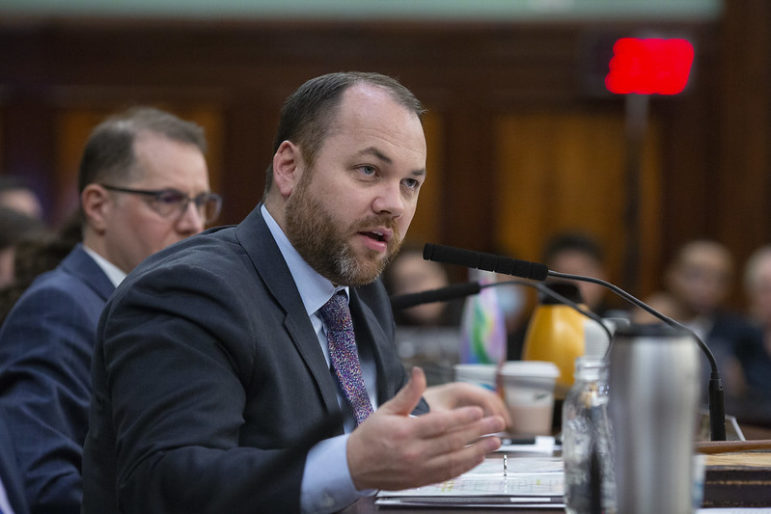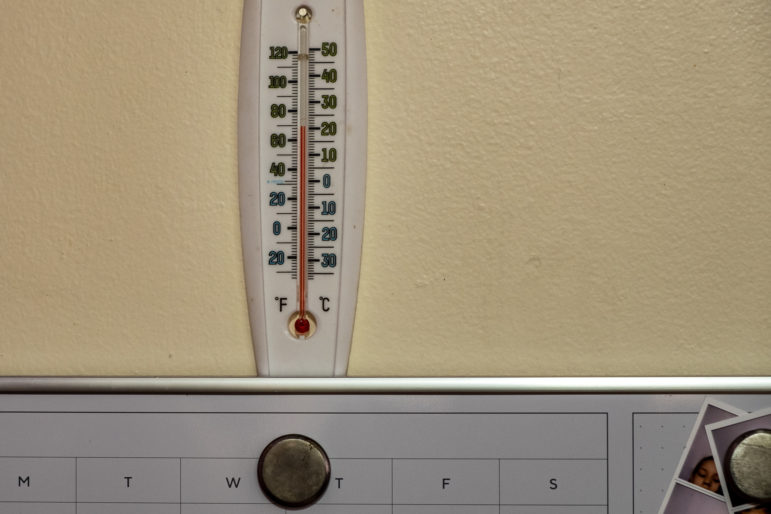
John McCarten/NYC Council
Speaker Corey Johnson said some of the capital spending shifts reflected revised construction timelines as well as belt-tightening.Despite some last minute restorations and additions, the city’s affordable housing program took a major hit in the $88.19 billion city budget approved by a 32-17 in the wee hours of Wednesday morning, the first moments of a new fiscal year.
The city’s housing agency, the Department of Housing Preservation and Development (HPD), saw its capital budget decreased from $1.48 billion to $902 million in the current fiscal year (2020) and from $1.19 billion to $741 million in the following fiscal year, pushing more than 40 percent of the capital program for affordable housing into later fiscal years.
In minor victories, the City Council was able to secure $3.2 million for Foreclosure Prevention Programs, $3.1 million for Community Housing Preservation Strategies, $1.7 million for the Home Loan Program and $637,500 for the Community Land Trust Initiative (for which advocates were hoping for $850,000).
At press time, it did not appear that the pilot basement apartment program, a major policy promise associated with the 2016 East New York rezoning, had escaped the mayor’s proposed $1.09 million cut, leaving the program with only $91,580 for operations. Initially, the basement pilot program, which was launched last year, was slated to receive $12 million dollars for operational costs during a three-year period.
The city was looking at a $9 billion dollar budget gap with no help in sight from the federal government or Albany in the near future. The de Blasio administration tapped into $4 billion of the city’s reserve budget to make the numbers work, according to the City Council.
The City Council Committee on Finance voted to pass the budget 13-7.
In the full City Council vote, there were no absentations, though Councilmember Costa Constantinides was absent and there is one vacant seat in the legislative body, for District 37 in Brooklyn’s Bushwick, Brownsville, Cypress Hills and East New York neighborhoods, where former City Councilmember Rafael Espinal resigned in January and a special election was cancelled because of the pandemic.
City Council Speaker Corey Johnson said he was seeking to cut $1 billion from the NYPD budget, but instead the City Council reached $837 million in reductions through cuts and transfers of functions to other departments. Johnson said he was “disappointed” with the budget and the circumstances, but contend the de Blasio administration showed no signs of “budging” on the budget any further and there was not enough consensus in the City Council to get the support he needed to pass a $1 billion dollar cut to the NYPD.
“The mayor didn’t want anywhere near the amount of cuts that we got on the NYPD. Many members did not want this level of cuts. Some members of course wanted more cuts,” Johnson said before the finance committee vote. “I wanted more cuts, but I was trying to find consensus to do something meaningful, knowing this is the beginning to save safety net programs for vulnerable new Yorkers in this really painful, difficult time, and to try to get this done before July 1st.”
At Johnson’s press conference, reporter Kathryn Brenzel from the Real Deal asked about the HPD affordable housing program’s cuts and its consequences. The speaker acknowledged that “there was a big capital takedown,” and while he noted that some of the reduction reflected a revised assessment by HPD of how much it would actually be able to spend in the coming year, given pandemic-related slowdowns to planning and construction, Johnson said: “We really care about those HPD capital dollars, because it goes to affordable housing, which we need more than ever right now in the middle of a pandemic and economic crisis.”
The speaker did cheer some of the housing-related programmatic restorations the Council achieved. “We got a partial restoration on the Landlord Ambassador program, which helps a lot of communities of color. We didn’t get the restoration that I wanted on the basement conversion program. We saved a lot of our initiatives that have to do with housing,” he said. “We saved a lot of the money in legal services for people that are going to have to deal with evictions, unless we get that federal stimulus money to help them.”
The capital-plan reductions could result in a reduction of over 5,000 new and 15,000 preserved affordable and supportive housing units over the next few years, according to analysis and testimony by the New York Housing Conference (NYHC).
“The decision to dramatically cut the capital budget will have a devastating impact on the city’s ability to provide adequate housing for thousands of vulnerable New Yorkers. These cuts mean tens of thousands of fewer affordable and supportive housing units over the next two years alone and they cast serious doubts on the city’s commitment to solving our housing crisis. We must now work to immediately fill these gaps with federal and state funding in order to provide New Yorkers with the affordable homes they deserve,” said Jolie Milstein, president and CEO of the New York State Association for Affordable Housing, in a statement:
The NYPD budget cut will eliminate two NYPD classes, reducing the headcount by 1,163 uniform officers. It will also remove NYPD from New York public schools, from homeless outreach efforts and crossing guards. Those responsibilities will fall to the city’s Department of Education, Department of Homeless Services and Department of Department of Health and Mental Hygiene. The City Council has also negotiated for the NYPD to reduce their overtime spending by $352 million by “instituting strict oversight on overtime limits.”
Councilmember Daniel Dromm, Chair of the Committee on Finance, said during the Committee on Finance vote, that he had been advocating for the removal of police presence in city’s public schools for the past decade.
The City Council was able to restore $100 million in Fair Student Funding, $11.6 million for Single Shepherd guidance counselors, $4.8 million for 38 social workers, and $1.8 million for other social-emotional supports for students, including funding for school health programs and its nurses.
Despite the salvage efforts, many Councilmembers voted no, a few saying they did not want to see cuts to the NYPD budget at all, especially amid protests and fears of a return to a crime-ridden city.
“Today’s budget may be the final nail in the coffin for the city and its safety. I am voting no on the budget because that is what the silent majority expects from us. This was a tough decision,” said Queens Councilmember Bob Holden. He said the budget would put public safety at risk, create a less respectful climate for NYPD officers and give less support to the middle class.
On the left, other Councilmembers said this was not the path to see the reform many protestors and advocacy groups had been calling for over the past several weeks.
Brooklyn Councilmember Antonio Reynoso, surrounded by protesters outside of his home, said he voted no because the budget fell short of the systemic change advocates were seeking. “In calling for the cuts to the NYPD budget, $1 billion was always an arbitrary number. What we are really pleading for is an end to a system of policing that discriminates based on economic status, race, religion, gender and sexual orientation, and an investment in the supports and services that will offer the opportunity of success to all New Yorkers,” he said. “I have prided myself in always working collaboratively to achieve results, but on this issue there is too much at stake and I cannot compromise or settle for half measures.”
The Family Homeless Coalition, a gathering of social-services agencies and advocacy organizations that had been lobbying to better policies to address the city’s homelessness crisis, welcomed the budget’s avoiding cuts to the Department of Social Services and the redirection of some NYPD money toward a family homeless shelter.
“Nevertheless, there is still work to be done to address New York City’s family homelessness crisis, which is inextricably tied to systemic racial injustice in our communities,” the coalition said in a statement. “We must work together to increase access to services proven to prevent homelessness, expand permanent affordable housing options and increase education and career training to keep families safely housed. The city must also prioritize improving shelter conditions and moving families out of shelter and into permanent housing as quickly as possible.”









